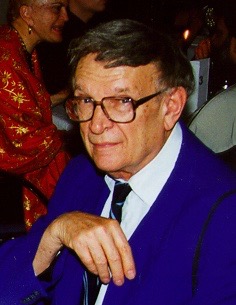
John Hospers
John Hospers (June 9, 1918 – June 12, 2011) was an American philosopher and political activist. Hospers was interested in Objectivism, and was once a friend of the philosopher Ayn Rand, though she later broke with him. In 1972, Hospers became the first presidential candidate of the Libertarian Party, and was the only minor party candidate to receive an electoral vote in that year's U.S. presidential election.[1]
"Hospers" redirects here. For the community in the midwestern United States, see Hospers, Iowa.
John Hospers
June 9, 1918
June 12, 2011 (aged 93)
- Libertarian (before 1991)
- Republican (after 1991)
Background[edit]
John Hospers was born on June 9, 1918, in Pella, Iowa, the son of Dena Helena (Verhey) and John De Gelder Hospers. He graduated from Central College in 1939 before earning an MA in English from the University of Iowa in 1942 and a PhD in philosophy from Columbia University in 1946. He conducted research, wrote, and taught in areas of philosophy, including aesthetics and ethics. He taught philosophy at the University of Minnesota, Brooklyn College, California State College Los Angeles (1966–1968) and at the University of Southern California, where for many years he was chairman of the philosophy department and professor emeritus.[2]
In 2002, an hour-long video about Hospers' life, work, and philosophy was released by the Liberty Fund of Indianapolis, as part of its Classics of Liberty series.[3][4]
Multiple sources, including the Libertarian Party, have referred to Hospers as the first openly gay man to run for president of the United States.[1][5][6] However, when The Guardian referred to him as such in his obituary, his family wrote to the newspaper to "strenuously" deny that he was gay.[7]
Hospers died in Los Angeles on June 12, 2011, at the age of 93.[8]
Libertarianism[edit]
Friendship with Ayn Rand[edit]
During the period he taught philosophy at Brooklyn College, Hospers was very interested in Objectivism. He appeared on radio shows with Ayn Rand, and devoted considerable attention to her ideas in his ethics textbook Human Conduct.[9]
According to Rand's biographer, Barbara Branden, Hospers met Rand when she addressed the student body at Brooklyn College. They became friends, and had lengthy philosophical conversations. Rand's discussions with Hospers contributed to her decision to write non-fiction. Hospers read Atlas Shrugged (1957), which he considered an aesthetic triumph.[10] Although Hospers became convinced of the validity of Rand's moral and political views, he disagreed with her about issues of epistemology, the subject of their extensive correspondence.[11] Hospers also disagreed with Rand about free will (with him favoring determinism, while she advocated a libertarian view) and conscription (Hospers supported it, Rand opposed this).[12] Rand broke with Hospers after he, in his position as moderator, critiqued her address, and she felt he had criticized her talk on "Art and Sense of Life" before the American Society of Aesthetics at Harvard.[13]
Hospers' books include:[14]
Hospers was editor of three anthologies, and contributed to books edited by others. He wrote more than 100 articles in various scholarly and popular journals.[19]
Hospers was editor of The Personalist (1968–1982) and The Monist (1982–1992),[14] and was a senior editor at Liberty magazine.[20] Additionally Hospers wrote the article "Art and Morality" for the Journal of Comparative Literature and Aesthetics (JCLA), Vol. 1, No. 1, Summer 1978.